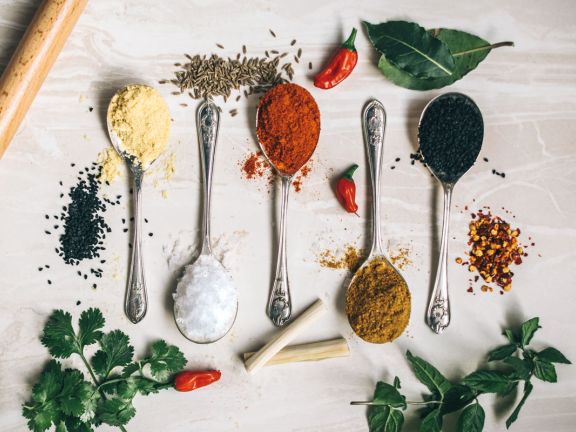Feeling of fullness, heartburn, or bloating are unfortunately not uncommon side effects of eating, dear EAT SMARTER readers. Such gastrointestinal problems can have various causes; often stress, eating too quickly, consuming excessively large or fatty meals are behind them.
Above all, a stressful lifestyle leads the body to inadequately absorb nutrients from what we provide it. This happens because the release of stress hormones regulates the body’s digestive tasks, reducing blood flow to the gastrointestinal tract and halting energy-consuming digestive processes. In extreme cases, this can prompt the body to get rid of food quickly, resulting in symptoms like diarrhea or nausea.
The most effective measure to tackle gastrointestinal problems is reducing stress. This starts with taking time for meals and avoiding quick, on-the-go eating. You can support your digestion with effective gastrointestinal home remedies. Today, I’d like to introduce my top ten favorites from the world of herbs and spices to you. Dare to spice up your dishes with anise, fenugreek, and more – not only reducing the use of salt but also nurturing your stomach and intestines.
REMEMBER!
Stress is the most common cause of digestive problems. Mindful eating and the use of home remedies from the world of spices and herbs restore digestion’s balance.
Gastrointestinal Home Remedy: Anise
Why healthy? The essential oils in anise alleviate spasms and thus help with bloating. Moreover, anise promotes the production of gastric juice.
How to enjoy it best? Anise makes fatty and heavy-to-digest foods more enjoyable, suitable for all kinds of braised dishes. For acute bloating, a tea made from anise fruits helps. Anise oil also aids externally against pain and cramps.
Gastrointestinal Home Remedy: Fenugreek
Why healthy? Fenugreek combats bloating, stimulates blood formation, and can help lower cholesterol levels.
How to enjoy it best? Fenugreek seeds provide the characteristic flavor to Indian curries and dhals. You can also grow spicy sprouts from the seeds for salads and more.
Gastrointestinal Home Remedy: Chili
Why healthy? Chili promotes saliva production and the activity of digestive enzymes. In the gut, chili acts as an antibacterial and can prevent diarrhea.
How to enjoy it best? Capsaicin, responsible for chili’s spiciness, is present in both chili powder and fresh peppers.
Gastrointestinal Home Remedy: Ginger
Why healthy? The enzyme Zingibain in ginger breaks down proteins, making them easier to digest. The aromatic-spicy ingredients stimulate the production of digestive juices, alleviating stomach pain and nausea.
How to enjoy it best? Avoid using ginger powder; only fresh rhizomes contain sufficient essential oils. Ginger helps as a tea for acute discomfort. Finely chopped or sliced, it enhances various meat, fish, and vegetarian dishes.
Gastrointestinal Home Remedy: Cardamom
Why healthy? Cardamom soothes the stressed stomach, especially after overeating. The spice promotes digestion and prevents bloating.
How to enjoy it best? Cardamom flavors pastries and curry dishes, but the seeds can also be added to herbal teas. In Arabic countries, cardamom is even used in coffee.
Gastrointestinal Home Remedy: Coriander
Why healthy? Coriander enhances gastric juice production and, due to its numerous essential oils, has antispasmodic and anti-inflammatory effects. The active ingredient Dodecanal in coriander acts as a natural antibiotic and can even kill Salmonella.
How to enjoy it best? Fresh coriander contains the most essential oils. Coriander leaves add zest to many dishes. The plant’s seeds are ingredients in curry powder.
Gastrointestinal Home Remedy: Turmeric
Why healthy? Turmeric strengthens the stomach and promotes digestion. Due to its high content of essential oils, this root has been valued for its healing and cleansing effects in Ayurvedic medicine for millennia.
How to enjoy it best? Fresh turmeric roots are now available. Turmeric doesn’t have a strong taste but decoratively colors dishes yellow.
Gastrointestinal Home Remedy: Clove
Why healthy? Cloves contain the essential oil Eugenol, which acts as an antibacterial and stimulates the production of gastric juice. Cloves also prevent bloating, promote appetite, and aid digestion.
How to enjoy it best? Cloves give meat and game dishes their typical flavor and are found in Christmas baked goods. As a tea infusion, cloves can alleviate acute abdominal discomfort.
Gastrointestinal Home Remedy: Oregano
Why healthy? Besides essential oils, oregano contains plenty of bitter and tannic substances that act as antibacterial and antifungal agents. Oregano has been used since the Middle Ages for its circulation-promoting properties.
How to enjoy it best? Oregano tastes best fresh and plays a significant role in Mediterranean cuisine.
Gastrointestinal Home Remedy: Cinnamon
Why healthy? Essential oils in cinnamon not only give it its characteristic scent but also act antibacterial in the digestive tract. They also stimulate bowel movement, help with bloating, and vomiting.
How to enjoy it best? Ensure to buy high-quality Ceylon cinnamon, not Cassia cinnamon. Cinnamon pairs with various braised dishes. A cinnamon stick in tea warms you nicely in autumn and winter.
